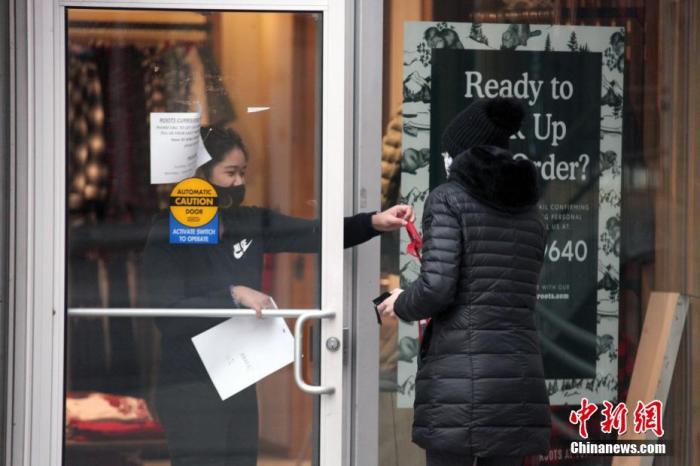China News Service, Toronto, January 15 (Reporter Yu Ruidong) Ontario, the most populous province in Canada, has implemented a four-week "home order" from January 14th, requiring people to stay in their homes unless they have a necessary reason. Inside.
The reporter saw in the downtown of Toronto, the capital of Ontario and Canada's largest city, that the traffic and pedestrians on the street have not changed significantly compared to before the implementation of the "Home Order".
However, compared with last fall, the pre-second wave of the epidemic, the proportion of pedestrians wearing masks has increased considerably.
On January 14, local time, passengers wearing masks were waiting for a bus in downtown Toronto, Canada.
Ontario, Canada's most populous province, where Toronto is located, implemented the "home order" from that day.
Photo by China News Agency reporter Yu Ruidong
The “home order” still allows people to go out for a number of “necessary” reasons, such as working in “necessary” industries, buying basic necessities or drugs, going to hospitals or clinics, assisting other people who must go out, and exercising outdoors.
On the morning of the same day, the Ontario government issued warning messages via mobile phones, etc., urging people to abide by the "home order."
In Toronto City Hall Plaza, dozens of people entered the ice rink at the appointed time and skated with music.
Yonge Street-Dundas Square in the city center is very crowded.
All shopping malls in the city refuse customers to enter, and some provide an appointment pick-up service.
Ontario has imposed a ban on the entire province since December 26 last year, but the momentum of the epidemic has not diminished. So on January 12 this year, it announced that it had entered a provincial emergency that lasted at least 28 days, intending to further restrict personnel contact.
On January 14, local time, a merchant in downtown Toronto, Canada temporarily refused to allow customers to enter, providing customers with an appointment pick-up service.
Ontario, Canada's most populous province, where Toronto is located, implemented the "home order" from that day.
Photo by China News Agency reporter Yu Ruidong
A statement issued by the Toronto police stated that the “home order” does not give the police the power to enter or intercept vehicles for inspection, and the police will not force people to explain why they go out or require them to produce work certificates.
The inland province of Alberta said on the same day that it will appropriately relax some epidemic prevention measures from next week, such as allowing barber shops to resume appointment services, and increasing the maximum number of outdoor parties.
On the same day, Major General Dany Fortin, the head of the Canadian National Action Center responsible for vaccine distribution, responded to the media and said that from April, vaccine manufacturers are expected to provide Canada with about 1 million doses of vaccine each week.
At present, the Canadian vaccination work has been carried out for one month. The federal government has distributed only 615,000 doses of vaccine to various places, and about 420,000 doses have been used. This is equivalent to only about 1% of the country’s population having received the first of two doses Agent.
Public opinion has begun to express dissatisfaction with the slow progress and worry about whether the shortage of vaccines will affect people's timely second dose.
In addition, a poll published by the Angus Reid Institute shows that since the beginning of the epidemic, more than 70% of Canadian respondents have cancelled or postponed their overseas or domestic travel plans.
Respondents who believe that Prime Minister Trudeau has done a good job in response to the epidemic accounted for 50%, a drop of 4 percentage points from November last year.
Nearly 90% of the interviewees believe that politicians should set a better example in avoiding unnecessary international travel.
The Canadian media recently exposed a number of politicians traveling abroad for various reasons, which aroused public attention.
Some politicians have lost their positions as a result.
On January 14, local time, people wearing masks walked on the streets of downtown Toronto, Canada.
Ontario, Canada's most populous province, where Toronto is located, implemented the "home order" from that day.
Photo by China News Agency reporter Yu Ruidong
Approximately 65% of the interviewees believed that if they were to make epidemic prevention decisions, all personal international travel should be completely banned.
About 26% are satisfied with the current restrictions.
As of the evening of January 14, Canada had reported a total of nearly 689,000 cases, with more than 7,500 new cases in a single day; 17,538 deaths and nearly 78,000 active cases.
(Finish)

